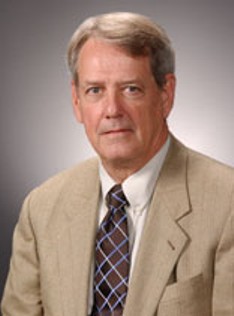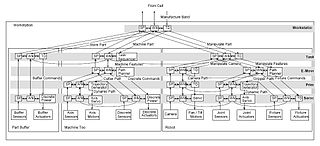
James Sacra Albus was an American engineer, Senior NIST Fellow and founder and former chief of the Intelligent Systems Division of the Manufacturing Engineering Laboratory at the National Institute of Standards and Technology (NIST).

Peter Norvig is an American computer scientist and Distinguished Education Fellow at the Stanford Institute for Human-Centered AI. He previously served as a director of research and search quality at Google. Norvig is the co-author with Stuart J. Russell of the most popular textbook in the field of AI: Artificial Intelligence: A Modern Approach used in more than 1,500 universities in 135 countries.

A multi-agent system is a computerized system composed of multiple interacting intelligent agents. Multi-agent systems can solve problems that are difficult or impossible for an individual agent or a monolithic system to solve. Intelligence may include methodic, functional, procedural approaches, algorithmic search or reinforcement learning.
Multimodal interaction provides the user with multiple modes of interacting with a system. A multimodal interface provides several distinct tools for input and output of data.

Automatic parking is an autonomous car-maneuvering system that moves a vehicle from a traffic lane into a parking spot to perform parallel, perpendicular, or angle parking. The automatic parking system aims to enhance the comfort and safety of driving in constrained environments where much attention and experience is required to steer the car. The parking maneuver is achieved by means of coordinated control of the steering angle and speed which takes into account the actual situation in the environment to ensure collision-free motion within the available space.

Data fusion is the process of integrating multiple data sources to produce more consistent, accurate, and useful information than that provided by any individual data source.
Adaptive autonomy refers to a suggestion for the definition of the notation 'autonomy' in mobile robotics.
A hierarchical control system (HCS) is a form of control system in which a set of devices and governing software is arranged in a hierarchical tree. When the links in the tree are implemented by a computer network, then that hierarchical control system is also a form of networked control system.
A hyper-heuristic is a heuristic search method that seeks to automate, often by the incorporation of machine learning techniques, the process of selecting, combining, generating or adapting several simpler heuristics to efficiently solve computational search problems. One of the motivations for studying hyper-heuristics is to build systems which can handle classes of problems rather than solving just one problem.
Jeff S. Shamma is an American control theorist. He is the Department Head and Professor of Industrial and Enterprise Systems Engineering at the University of Illinois Urbana-Champaign. Formerly, he was a Professor of Electrical engineering at the King Abdullah University of Science and Technology. Before that, he held the Julian T. Hightower Chair in Systems & Control Systems and Controls at the Georgia Institute of Technology. He is known for his early work in nonlinear and adaptive control, particularly on gain scheduling, robust control, and more recently, distributed systems.

Real-time Control System (RCS) is a reference model architecture, suitable for many software-intensive, real-time computing control problem domains. It defines the types of functions needed in a real-time intelligent control system, and how these functions relate to each other.

Roberto Battiti is an Italian computer scientist, Professor of computer science at the University of Trento, director of the LIONlab, and deputy director of the DISI Department and delegate for technology transfer.

Marta Zofia Kwiatkowska is a Polish theoretical computer scientist based in the United Kingdom.
Machine ethics is a part of the ethics of artificial intelligence concerned with adding or ensuring moral behaviors of man-made machines that use artificial intelligence, otherwise known as artificial intelligent agents. Machine ethics differs from other ethical fields related to engineering and technology. It should not be confused with computer ethics, which focuses on human use of computers. It should also be distinguished from the philosophy of technology, which concerns itself with technology's grander social effects.
Mengchu Zhou is a Chinese-American Distinguished Professor of electrical and computer engineering in the Helen and John C. Hartmann Dept. of Electrical and Computer Engineering at New Jersey Institute of Technology (NJIT) and at Macau University of Science and Technology. He is the Chairman of IKAS Industries of Shenzhen in China and a Board Member of OneSmart Education Group headquartered in China.
Petros A. Ioannou is a Cypriot American Electrical Engineer who made important contributions in Robust Adaptive Control, Vehicle and Traffic Flow Control, and Intelligent Transportation Systems.

Margarita Chli is an assistant professor and leader of the Vision for Robotics Lab at ETH Zürich in Switzerland. Chli is a leader in the field of computer vision and robotics and was on the team of researchers to develop the first fully autonomous helicopter with onboard localization and mapping. Chli is also the Vice Director of the Institute of Robotics and Intelligent Systems and an Honorary Fellow of the University of Edinburgh in the United Kingdom. Her research currently focuses on developing visual perception and intelligence in flying autonomous robotic systems.

Baher Abdulhai is a Canadian civil engineer, academic, entrepreneur, and researcher. He is a Professor in the Department of Civil Engineering, Director of Intelligent Transportation Systems Centre, and Co-Director of iCity Centre for Automated and Transformative Transportation at the University of Toronto. He is also the CEO and managing director of IntelliCAN Transportation System Inc.









